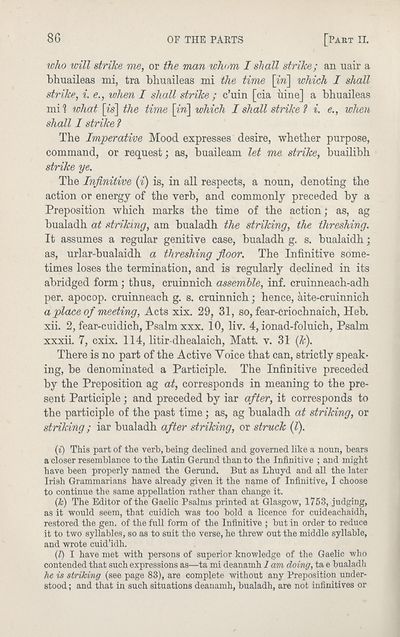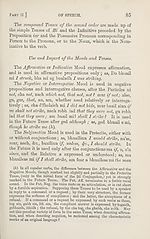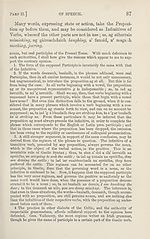Books and other items printed in Gaelic from 1871 to 1900 > Elements of Gaelic grammar
(106) Page 86
Download files
Complete book:
Individual page:
Thumbnail gallery: Grid view | List view

8G
OF THE PARTS
[Part II.
who will strike me, or the man whom I shall strike; an uair a
bhuaileas mi, tra bhuaileas mi the time \in\ which I shall
strike, i. e., ivhen I shall strike ; c’uin [cia iiine] a bhuaileas
mi 1 what [is] the time [m] which I shall strike ? i. e., when
shall I strike ?
The Imperative Mood expresses desire, whether purpose,
command, or request; as, buaileam let me strike, buailibh
strike ye.
The Infinitive (i) is, in all respects, a noun, denoting the
action or energy of the verb, and commonly preceded by a
Preposition which marks the time of the action; as, ag
bualadh at striking, am bualadh the striking, the threshing.
It assumes a regular genitive case, bualadh g. s. bualaidh;
as, urlar-bualaidh a threshing floor. The Infinitive some¬
times loses the termination, and is regularly declined in its
abridged form ; thus, cruinnich assemble, inf. cruinneach-adh
per. apocop. cminneach g. s. cruinnich; hence, aite-cruinnich
a place of meeting, Acts xix. 29, 31, so, fear-criochnaich, Heb.
xii. 2, fear-cuidich, Psalm xxx. 10, liv. 4, ionad-foluich, Psalm
xxxii. 7, cxix. 114, litir-dhealaich, Matt. v. 31 (k).
There is no part of the Active Voice that can, strictly speak¬
ing, be denominated a Participle. The Infinitive preceded
by the Preposition ag at, corresponds in meaning to the pre¬
sent Participle; and preceded by iar after, it corresponds to
the participle of the past time; as, ag bualadh at striking, or
striking; iar bualadh after striking, or struck (l).
(i) This part of the verb, being declined and governed like a noun, bears
a closer resemblance to the Latin Gerund than to the Infinitive ; and might
have been properly named the Gerund. But as Lhuyd and all the later
Irish Grammarians have already given it the name of Infinitive, I choose
to continue the same appellation rather than change it.
(k) The Editor of the Gaelic Psalms printed at Glasgow, 1753, judging,
as it would seem, that cuidich was too bold a licence for cuideachaidh,
restored the gen. of the full form of the Infinitive ; but in order to reduce
it to two syllables, so as to suit the verse, he threw out the middle syllable,
and wrote cuid’idh.
(l) I have met with persons of superior knowledge of the Gaelic who
contended that such expressions as—ta mi deanamh 1 am doing, ta e bualadh
he is striking (see page 83), are complete without any Preposition under¬
stood ; and that in such situations deanamh, bualadh, are not infinitives or
OF THE PARTS
[Part II.
who will strike me, or the man whom I shall strike; an uair a
bhuaileas mi, tra bhuaileas mi the time \in\ which I shall
strike, i. e., ivhen I shall strike ; c’uin [cia iiine] a bhuaileas
mi 1 what [is] the time [m] which I shall strike ? i. e., when
shall I strike ?
The Imperative Mood expresses desire, whether purpose,
command, or request; as, buaileam let me strike, buailibh
strike ye.
The Infinitive (i) is, in all respects, a noun, denoting the
action or energy of the verb, and commonly preceded by a
Preposition which marks the time of the action; as, ag
bualadh at striking, am bualadh the striking, the threshing.
It assumes a regular genitive case, bualadh g. s. bualaidh;
as, urlar-bualaidh a threshing floor. The Infinitive some¬
times loses the termination, and is regularly declined in its
abridged form ; thus, cruinnich assemble, inf. cruinneach-adh
per. apocop. cminneach g. s. cruinnich; hence, aite-cruinnich
a place of meeting, Acts xix. 29, 31, so, fear-criochnaich, Heb.
xii. 2, fear-cuidich, Psalm xxx. 10, liv. 4, ionad-foluich, Psalm
xxxii. 7, cxix. 114, litir-dhealaich, Matt. v. 31 (k).
There is no part of the Active Voice that can, strictly speak¬
ing, be denominated a Participle. The Infinitive preceded
by the Preposition ag at, corresponds in meaning to the pre¬
sent Participle; and preceded by iar after, it corresponds to
the participle of the past time; as, ag bualadh at striking, or
striking; iar bualadh after striking, or struck (l).
(i) This part of the verb, being declined and governed like a noun, bears
a closer resemblance to the Latin Gerund than to the Infinitive ; and might
have been properly named the Gerund. But as Lhuyd and all the later
Irish Grammarians have already given it the name of Infinitive, I choose
to continue the same appellation rather than change it.
(k) The Editor of the Gaelic Psalms printed at Glasgow, 1753, judging,
as it would seem, that cuidich was too bold a licence for cuideachaidh,
restored the gen. of the full form of the Infinitive ; but in order to reduce
it to two syllables, so as to suit the verse, he threw out the middle syllable,
and wrote cuid’idh.
(l) I have met with persons of superior knowledge of the Gaelic who
contended that such expressions as—ta mi deanamh 1 am doing, ta e bualadh
he is striking (see page 83), are complete without any Preposition under¬
stood ; and that in such situations deanamh, bualadh, are not infinitives or
Set display mode to:
![]() Universal Viewer |
Universal Viewer | ![]() Mirador |
Large image | Transcription
Mirador |
Large image | Transcription
Images and transcriptions on this page, including medium image downloads, may be used under the Creative Commons Attribution 4.0 International Licence unless otherwise stated. ![]()
| Rare items in Gaelic > Books and other items printed in Gaelic from 1871 to 1900 > Elements of Gaelic grammar > (106) Page 86 |
|---|
| Permanent URL | https://digital.nls.uk/106560549 |
|---|
| Description | Out-of-copyright books printed in Gaelic between 1631 and 1900. Also some pamphlets and chapbooks. Includes poetry and songs, religious books such as catechisms and hymns, and different editions of the Bible and the Psalms. Also includes the second book ever published in Gaelic in 1631. |
|---|

